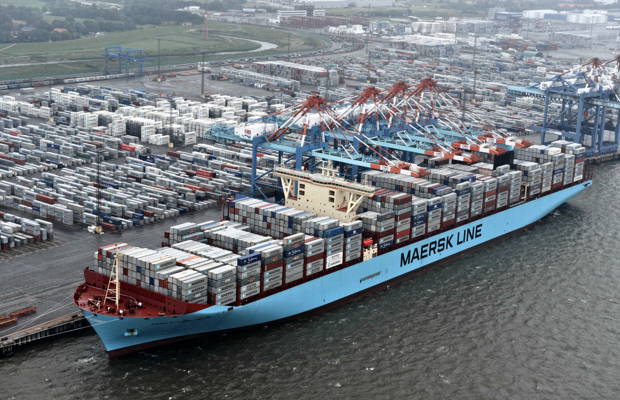China was pointed to in business media as the main reason as the Maersk Group reported on 23 October that it will adjust its expectation for the 2015 result from an underlying result around USD 4.0bn to an underlying result of around USD 3.4bn.

18.8.13
A weaker global container market is a reality amid concern that China’s economic growth is slowing. Container rates have been falling and Maersk has been forced to adjust its forecasts accordingly.
The previous expectation, as announced in the Q2 report, was based on an underlying result contribution from Maersk Line above USD 2.2bn. The Group now expects an underlying result from Maersk Line of around USD 1.6bn.
The Group’s sensitivity guidance for the last six months of 2015 states that a general decline in the freight rate of 100 USD/FFE will impact Maersk Line’s result negatively by around USD 0.5bn, and that a volume reduction of 100,000 FFE will have a negative impact of around USD 0.1bn.
All other business units maintain their result guidance for 2015.
“It is regrettable that we have to adjust our expectations for the 2015 result. All of our business units delivered a positive result in the third quarter, despite difficult conditions across our industries,” says Group CEO Nils S. Andersen.
The Group’s preliminary reported result for Q3 is USD 778m (USD 1,5bn) with an underlying result of USD 662m (USD 1,3bn). The preliminary reported result for the first nine months is USD 3,436m (USD 5bn) with an underlying result of USD 3,080m (USD 3,7bn).
The container shipping market has deteriorated beyond the Group’s expectations especially in the later part of Q3 and October and the Group does not expect market recovery in 2015.
“Maersk Line has over the years taken steps to ensure a cost effective and resilient operation, but the current deterioration in the container shipping market is impacting also our business,” says the Group CEO.
The average freight rate In Q3 that Maersk Line achieved was lower than expected. As a result of the market circumstances, initiatives have been taken to adjust Maersk Line’s network accordingly.
Earlier, on 14 August, Danish shipping and oil giant Maersk Group had been optimistic about business prospects in China despite the global trade downturn and question marks over the impact of the recent weakening of the Chinese currency.
The group’s revenue has roughly doubled since 2009 in China, which is the largest cargo origin for its container shipping business, said Tim Smith, chairman of Maersk China and chief representative of Maersk Group North Asia.
Business in the country is continuing to flourish, and Maersk sees opportunities in the economy’s transition to consumption and service-led growth as well as in the Belt and Road regional trade and infrastructure network proposed by China, Smith had told reporters.
